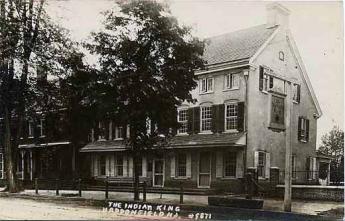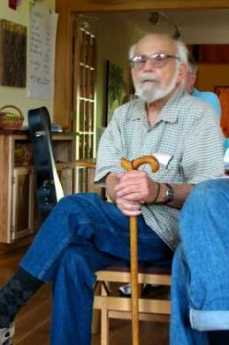Related Topics
Religious Philadelphia
William Penn wanted a colony with religious freedom. A considerable number, if not the majority, of American religious denominations were founded in this city. The main misconception about religious Philadelphia is that it is Quaker-dominated. But the broader misconception is that it is not Quaker-dominated.
Haddonfield (all 26)(1 of1)volume 38
 Haddonfield is a bit of a secret. It's Philadelphia's "Main Line, East"
Haddonfield is a bit of a secret. It's Philadelphia's "Main Line, East"
Quakers: All Alike, All Different
Quaker doctrines emerge from the stories they tell about each other.
Volunteerism
The characteristic American behavior called volunteerism got its start with Benjamin Franklin's Junto, and has been a source of comment by foreign visitors ever since. It's still a very active force.
In Memoriam
Charles Peterson
Lewis B, Flinn, M.D.Wilton A. Doane,MD
Henry Cadbury
Martin Orne, MD, PhDGeorge W. Gowen, MD
Kenneth Gordon, MD
Mary Stuart Fisher, MDOrville P. Horwitz,MD
Lewis Harlow van Dusen, Jr.
Hobart Reiman, MD.
Lindley B. Reagan, M.D.
Allan v. Heely
Frederick Mason Jones, Jr.
Russell Roth,MD
George Willoughby
Earle B. Twitchell
Jonathan Evans Rhoads, Sr.
Garfield G. Duncan,MD
Hastings Griffin
Joseph P. Nicholson
Howard LewisAl DriscollHenry Bockus, MD
Mary Dunn
William H. Taylor
Abraham Rosenthal
Quaker Peace Testimony
New topic 2016-12-04 04:05:49 description
Interesting Quaker Characters
All alike, but all different.
George Willoughby, 95, Peace Activist

|
| George Willoughby |
Age was nothing but a number for 95-year-old peace activist George Willoughby of Deptford. His worldwide antiwar protests and nonviolent teachings started when he was in his mid-40s and continued until just weeks ago.
Mr. Willoughby was planning a six-week trip this month to India to meet friends he had made during visits to the birthplace of his idol, Mohandas K. Gandhi, and probably to give some of his trademark peace talks.
But Mr. Willoughby died at home of heart failure Jan. 5, a month short of the journey.
A Quaker who led local protests and famous treks from San Francisco to Moscow and from New Delhi to Beijing, Mr. Willoughby recruited many advocates for nonviolent conflict resolution, said a friend and member of the Central Philadelphia Meeting, Nicole Hackel.
"Once you experienced him, you didn't forget him," Hackel said, adding that she became a Quaker in the 1970s because of Mr. Willoughby's influence. "George would engage in conversation with anyone, even a 5-year-old who was attending a meeting for the first time."
Mr. Willoughby became a household name for area Quakers after he became director of the Central Committee of Conscientious Objectors in Philadelphia in 1954. He soon was a frequent presence in the news, mostly under headlines with the words peace, marchers, and protest.
In 1958, Mr. Willoughby was one of five crewmen on the sailboat Golden Rule who received 60-day jail sentences in Honolulu for trying to sail to the area of the Pacific Ocean where the U.S. government was testing nuclear bombs in the atmosphere.
That was Mr. Willoughby's first of many incarcerations, said his son, Alan.
"The Society of Friends in Honolulu brought him a lot of decent food. . . . He always spoke highly" of the Hawaii jail experience, his son said with a slight laugh.
Two years later, Mr. Willoughby organized a dual-continent march to protest nuclear testing. Protesters in groups of about a dozen each covered six countries in 10 months between the United States and the Soviet Union.
Mr. Willoughby joined the group in Poland. Soviet officials stopped them 100 yards short of the Lenin-Stalin tomb in Moscow's main square, according to reports at the time. Instead of delivering speeches, the group was forced to stand in the square in a silent vigil.
In 1963, Mr. Willoughby embarked with about a dozen others on what he intended to be his longest hike - 4,000 miles from New Delhi to Beijing to promote peace between India and China.
Before his journey, a Philadelphia Evening Bulletin reporter asked whether there was a better way than marching to bring about peace.
Mr. Willoughby responded: "Most people of these countries walk; we can reach them. Even if it does no good at all, it is worth it. It's an idea I believe in, and if it produces fruit, so much the better."
After eight months of walking, Mr. Willoughby and company were stopped at the India-China border and barred from crossing into China.
In the next three decades, Mr. Willoughby's projects included the formation of A Quaker Action Group, which opposed the Vietnam War, in 1966; the Life Center Community in West Philadelphia, a training and campaign center for nonviolence, in 1971; and Peace Brigades International, a human-rights group, in 1981.
One of his most memorable contributions to South Jersey, family and friends said, was the creation of the Old Pine Farm Natural Lands Trust, 45 acres of natural conservancy in Deptford.
In his later years, Mr. Willoughby received honors around the world for his peace work, such as the Jamnalal Bajaj Foundation award in 2002 in Mumbai, India, which recognizes those who promote Gandhi's ideas and values.
Born in Cheyenne, Wyo., Mr. Willoughby spent much of his childhood in the Panama Canal Zone, where his father worked in construction.
Mr. Willoughby was part of his high school's JROTC program, but, according to friend and biographer Gregory Barnes, he quickly realized the military was not for him.
A family rift led Mr. Willoughby to live in Des Moines, Iowa, with a family friend, Elinor Robson. In the 1930s, he received three degrees in political science, including a doctorate from the University of Iowa.
In 1940, Mr. Willoughby married Lillian Pemberton, a "birthright Quaker" he met in college. By 1944, he became a Quaker, fully immersed in the Religious Society of Friends' beliefs and ideologies.
In the late 1940s and early 1950s, Mr. Willoughby worked for the Des Moines office of the American Friends Service Committee before moving to Philadelphia with his wife and their four children.
After bypass surgery in 2000, Mr. Willoughby had to slow down. He wasn't able to participate in as many marches and rallies as he would have liked, his son said, but he remained active online.
One of Mr. Willoughby's last protests was in March 2003, an organized obstruction of the entrance of a federal building in Philadelphia to protest the war in Iraq. He took photos of his 89-year-old wife getting her head shaved as part of the demonstration.
"I've never seen her like that, but I like it," he told a reporter. Lillian Willoughby died last year.
One of Mr. Willoughby's last speeches was at Scattergood Friends School in Iowa a few months after his wife's death. He took a road trip with Hackel and one of his daughters to the Scattergood refuge camp's 70th-anniversary reunion, which was held at the school.
Once there, Mr. Willoughby did what he did best: talk. "He just fascinated the young people there," Hackel said.
Some of Mr. Willoughby's last words of advice were: "It is the duty of the opposition to oppose," his son said. "He thought it is your duty to speak up . . . for what you believe is right."
In addition to his son, Mr. Willoughby is survived by daughters Sally, Anita, and Sharon and three grandchildren.
A memorial service will be held at 2 p.m. Saturday at the Friends Center at 15th and Cherry Street
Originally published: Friday, February 05, 2010; most-recently modified: Monday, May 20, 2019